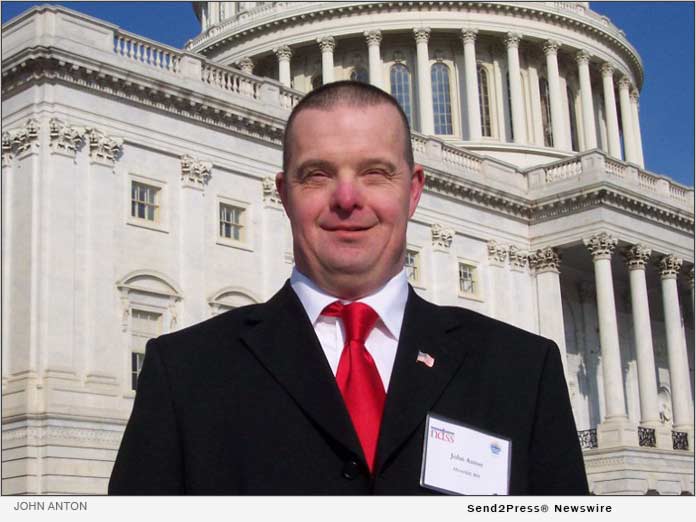HAVERHILL, Mass. /Massachusetts Newswire/ — The National Down Syndrome Society (NDSS), the leading organization for all individuals with Down syndrome, and the Massachusetts Down Syndrome Congress (MDSC), the premier resource for information, advocacy and networking in Massachusetts, applaud the testimony of John Anton at Wednesday’s Education & Labor Committee joint subcommittee hearing titled “Phasing Out Subminimum Wages: Supporting the Transition to Competitive Integrated Employment for Workers with Disabilities.”

Mr. Anton, who works as MDSC’s legislative specialist, has been a vocal advocate on issues concerning the rights of individuals with Down syndrome. His testimony is an important part of efforts by the community to support the passage of the Transformation to Competitive Integrated Employment Act (H.R. 2373) which was introduced by Congressman Bobby Scott (D-VA) and Congresswoman Cathy McMorris Rodgers (R-WA).
At the hearing, Mr. Anton spoke about the vast difference between his work at MDSC and his experience working in a sheltered workshop. While working for subminimum wages, he was bored and asked his boss for more work. He was told no and quit his job on the spot. He went on to work for the Massachusetts State House and intern in Congresswoman McMorris Rodgers’ office prior to his role at MDSC.
“It is all about respect and dignity as a citizen for me and not being stigmatized by labels, which belong on jars not people!” said Mr. Anton.
“We are thrilled that John had an opportunity to lend his powerful voice in this important forum,” said MDSC Executive Director Maureen Gallagher. “Being paid an unfair wage is, unfortunately, a topic that John knows all too well. But not only has he survived, he has become a leading spokesperson in the movement to ensure that all people with Down syndrome and other disabilities have equal access to employment and other opportunities.” Gallagher added that MDSC is also working on programmatic solutions to the disability employment crisis. “Through our Your Next Star employment initiative, MDSC is outreaching directly to employers to open their eyes to the abilities of employees with Down syndrome and help them diversify their workforces,” she said.
Section 14(c) of the Fair Labor Standards Act (FLSA) of 1938 allows employers to pay people with disabilities less than the minimum wage (subminimum wage). People with disabilities who are employed under the 14(c) certificates are trained to perform mundane tasks for as little as $0.02 an hour, according to a 2018 report from the National Council on Disability.
“Despite being referred to as training programs, these environments do very little to build capacity or transfer into skills necessary to help people transition into other employment options,” said Matteo Lieb, Employment Policy and Program Manager at NDSS. “This practice reinforces the misconception that individuals with disabilities are less productive and creates an artificial barrier to future employment opportunities.”
As support builds for wage equity for people with disabilities around the country, NDSS, in partnership with the MDSC and other grassroots advocates, will continue to support phasing out subminimum wage at the federal and state levels.
“Equitable employment is a key legislative priority for NDSS,” said President & CEO Kandi Pickard. “We believe every individual deserves the opportunity to work in an inclusive, competitive role where they can acquire meaningful skills and are paid a fair wage. Phasing out 14(c) will help pave the way for equality in the workplace for people with Down syndrome and other disabilities.”
About NDSS
The National Down Syndrome Society (NDSS) is the leading human rights organization for all individuals with Down syndrome. NDSS envisions a world in which all people with Down syndrome have the opportunity to enhance their quality of life, realize their life aspirations and become valued members of welcoming communities. Founded in 1979, NDSS supports and advocates for the Down syndrome community by focusing on three key areas of programming: Resources & Support, Policy & Advocacy and Community Engagement. Within these focus areas NDSS engages in various activities, events and programs such as the National Advocacy & Policy Center, which seeks to create systemic change through engaged advocacy; the National Buddy Walk® Program, which honors and celebrates individuals with Down syndrome in local communities across the world, and other initiatives that provide support, informational resources and community engagement opportunities for individuals with Down syndrome and those who support them. Visit http://www.ndss.org for more information about NDSS.
About MDSC
MDSC has been working with NDSS for over a decade to promote policies that improve the lives of all people with Down syndrome. MDSC has sent a delegation to NDSS’s Buddy Walk on Washington annually to meet with legislators and share the importance of our disability policy priorities. MDSC also offers a broad array of programs to serve people with Down syndrome and their families throughout Massachusetts, including: A Buddy Walk® Program that gives individuals, schools, community groups, and local businesses an opportunity to get involved in fundraising campaigns; Self-Advocate Programs like Advocates in Motion and our Self-Advocate Advisory Council, which provide opportunities for teens and adults with Down syndrome while making empowerment a central component; Parents First Call Program, a volunteer, state-wide group of trained parent mentors available 24/7 to listen, share, answer questions, and provide valuable information; and other programs like our Diversity Outreach & Support Program and our affiliate programs Dads Appreciating Down Syndrome (D.A.D.S.) and the Down Syndrome-Autism Connection that serve the entire Down syndrome community.
To learn more, visit https://mdsc.org/ and https://www.yournextstar.org/ for more information.
VIDEO (YouTube): https://youtu.be/ZCGgJKhim3I
RELATED LINKS:
https://www.congress.gov/bill/117th-congress/house-bill/2373





